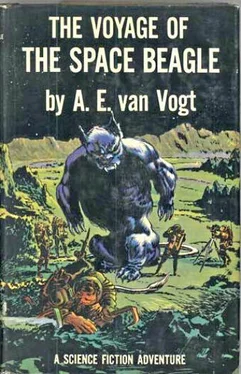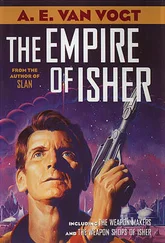The visualization both excited and disturbed him. Suppose he did establish a relationship with this creature whereby he was affected by its nervous system, and it by his. Suppose he reached the point where he could hear with its ears, see with its eyes, and feel to some degree what it felt. These were sensory impressions only.
Could he hope to bridge the gap and induce motor responses in the creature’s muscles? Would he be able to force it to walk, turn its head, move its arms, and generally, make it act as his body? The attack on the ship was being made by a group working together, thinking together, feeling together. By gaining control of one member of such a group, could he exercise some control over all?
His momentary vision must have come through the eyes of one individual. What he had experienced so far did not suggest any kind of group contact. He was like a man imprisoned in a dark room, with a hole in the wall in front of him covered with layers of translucent material. Through this filtered a vague light. Occasionally, images penetrated the blur, and he had glimpses of the outside world. He could be fairly certain that the pictures were accurate. But that did not apply to the sounds that came through another hole on a side wall, or the sensations that came to him through still other holes in the ceiling and floor.
Human beings could hear frequencies up to twenty thousand vibrations a second. That was where some races started to hear. Under hypnosis, men could be conditioned to laugh uproariously when they were being tortured, and shriek with pain when tickled. Stimulation that meant pain to one life form could mean nothing at all to another.
Mentally, Grosvenor let the tensions seep out of him. There was nothing for him to do but relax and wait.
He waited.
It occurred to him presently that there might be a connection between his own thoughts and the sensations he received. That picture of the inside of the building — what had he thought just before it came? Principally, he recalled, he had visualized the structure of the eye.
The connection was so obvious that his mind trembled with excitement. There was another thing, also. Until now, he had concentrated on the notion of seeing and feeling with the nervous system of the individual. Yet the realization of his hopes depended on his establishing contact with, and control of, the group of minds that had attacked the ship.
He saw his problem, suddenly, as one that would require control of his own brain. Certain areas would have to be virtually blacked out, kept at minimum-performance levels. Others must be made extremely sensitive, so that all incoming sensations found it easier to seek expression through them. As a highly-trained auto-hypnotic subject, he could accomplish both objectives by suggestion.
Vision came first, of course. Then muscular control of the individual through whom the group was working against him.
Flashes of coloured light interrupted his concentration. Grosvenor regarded them as evidence of the effectiveness of his suggestions. And he knew that he was on the right track when his vision cleared suddenly, and stayed clear.
The scene was the same. His control still sat on one of the roosts inside one of the tall buildings. Hoping fervently that the vision was not going to fade, Grosvenor began to concentrate on moving the Riim’s muscles.
The trouble was that the ultimate explanation of why a movement could occur at all was obscure. His visualization could not possibly include in detail the millions of cell responses involved in the raising of one finger. He thought now in terms of a whole limb. Nothing happened. Shocked but determined, Grosvenor tried symbol hypnosis, using a single cue word to cover the entire complex process.
Slowly, one of the attenuated arms came up. Another cue, and his control stood up cautiously. Then he made it turn its head. The act of looking reminded the bird being that that drawer and that cabinet and that closet were “mine”. The memory barely touched the conscious level. The creature knew its own possessions and accepted the fact without concern.
Grosvenor had a hard time fighting down his excitement. With tense patience, he had the bird being get up from a sitting position, raise its arms, lower them, and walk back and forth along the roost. Finally, he made it sit down again.
He must have been keyed up, his brain responsive to the slightest suggestion, because he had barely started to concentrate again when his whole being was flooded by a message that seemed to affect every level of his thought and feeling. More or less automatically, Grosvenor translated the anguished thoughts into familiar verbalisms.
“The cells are calling, calling. The cells are afraid. Oh, the cells know pain! There is darkness in the Riim world. Withdraw from the being — far from Riim…. Shadows, darkness, turmoil…. The cells must reject him…. But they cannot.
They were right to try to be friendly to the being who came out of the great dark, since they did not know he was an enemy…. The night deepens. All cells withdraw…. But they cannot….”
Grosvenor thought blankly, Friendly!
It fitted also. He could see how, in a nightmarish fashion, everything that had happened so far could be explained as easily one way as the other. Dismayed, he realized the seriousness of the situation. If the catastrophe that had already occurred aboard the ship were the result of a misguided and ignorant attempt at friendly communication, then what damage might they not be able to do if they were hostile?
His problem was greater than theirs. If he broke his connection with them, they would be free. Now that could mean an attack. By avoiding him they might actually attempt destruction of the Space Beagle.
He had no recourse but to continue what he had planned, in the hope that something would happen that he could turn to his favour.
He concentrated first on what seemed the most logical intermediate stage: the transfer of control to another alien. The choice, in the case of these beings, was obvious.
“I am loved!” he told himself, deliberately producing the sensation that had confused him earlier. “I am loved by my parent body, from which I am growing to wholeness. I share my parent’s thoughts, but already I see with my own eyes, and know that I am one of the group—”
The transition came suddenly, as Grosvenor had expected it might. He moved the smaller, duplicate fingers. He arched the fragile shoulders. Then he oriented himself again to the parent Riim. The experiment was so completely satisfactory that he felt ready for the bigger jump that would take him into association with the nervous system of a more distant alien.
And that, also, proved to be a matter of stimulating the proper brain centres. Grosvenor came to awareness standing in a wilderness of brush and hill. Directly in front of him was a narrow stream. Beyond it, an orange sun rode low in a dark purple sky that was spotted with fleecy clouds. Grosvenor made his new control turn completely around. He saw that a small roost building nestled among the trees farther along the stream. It was the only habitation in sight. He walked over to it and looked inside. In the dim interior he made out several roosts, one with two birds sitting on it. Both sat with eyes closed.
It was quite possible, he decided, that they were participating in the group assault on the Space Beagle.
From there, by a variation of the stimulus, he transferred his control to an individual on a part of the planet where it was night. The transition this time was even faster. He was in a lightless city, with ghostly buildings and catwalks. Swiftly, Grosvenor moved on to association with other nervous systems. He had no clear idea why the rapport was established with one Riim, and not with another who fitted the same general requirement. It could be that the stimulation affected some individuals slightly faster than it affected others. It was even possible that they were descendants or body relatives of his original parent control. When he had been associated with more than two dozen Riim all over the planet, it seemed to Grosvenor that he had a good over-all impression.
Читать дальше











